#monotropes
Text
The Mistreatment of a Sacred Plant
Recently, I had an unpleasant emotional and spiritual shock. I struggle a bit to talk about it because of how upset it makes me, but I feel like the subject matter is important enough to warrant the discussion.
As some may know, one of my dearest plant allies is the Ghost Pipe. I work closely with Monotropes in general, but the Tutelary Spirit of Monotropa Uniflora, in particular, serves as a chief Plant Patron of mine. Part of maintaining this relationship involves visiting a specific location in a devotional capacity, in order to watch, tend, and learn from the population of Ghost Pipes that grow there. I went back to this place not long ago, in order to thank the spectral flowers for lending their power and grace to our Handfasting Ritual, and I was horrified to discover that every one of the colonies I've stewarded over the last few years is completely gone.
They aren't a major food-source for any animals I know of, and this was way more than a die-back, since I recognize what that looks like. What's more, for every colony to have naturally vanished without a trace since the last time I visited was unthinkable. As such, I'm all but sure that someone "Wildcrafted" them to make tinctures for sale. This is absolutely heartbreaking and infuriating, as they have totally misused and abused this sacred plant, and damaged an extremely fragile and unique ecosystem in the process.
The main issue with harvesting Ghost Pipes isn't necessarily that it's rare, though it is in some areas. The real problems are how sensitive they are and how exacting their life cycle is. Sometimes, just touching a Ghost Pipe is enough to damage the plant, disrupt the re-seeding process, and prevent it from growing back. What's worse, the conditions required for the succesful development of these ethereal organisms are extremely specific. Monotropes are Mycoheterotrophs, which derive their energy through mychorizal parasitism. This is to say, they can only get their energy by siphoning it from a small range of subterranean fungi, who in turn, siphon their energy from the roots of certain trees. Between these and other factors, Monotropes are virtually impossible to cultivate or propagate, and they are especially susceptible to the effects of overharvesting. Unfortunately, unethical harvesting has steadily become a real problem in Western Herbalism, where Ghost Pipe tincture is growing in popularity for its mystique and its beautiful violet color. And while it does have a long history of traditional medicinal use as a Nervine, people who aren't getting it purely for its aesthetic qualities are buying it as a miracle cure, without any real understanding of how or why to use it.
I've been muddling through strong feelings of anger, sorrow, and impotence since this happened, and I feel sick thinking about someone out there irreverently peddling this precious medicine under a capitalist guise of "Herbal Wisdom." These sorts of business practices are thoughtless, ecologically unethical, and spiritually blasphemous (as far as I'm concerned). So, I beg you: please think thrice about what you are doing before you harvest a plant. Ask yourself these five questions, and weigh the answers against each other: "Why do I want to harvest this plant?' 'What harm will my behavior cause to this organism?' 'What harm will my behavior cause to this species?' 'What harm will my behavior cause to this ecosystem?' and, 'What will I suffer as a result of not harvesting this plant?
I offer up my most fervent prayers that the seeds I helped to spread earlier in the year will count for something.

#ghost pipes#ghost pipe#monotropes#monotropa#monotropa uniflora#foraging#harvesting#harvest#herbalism#plant magic#plant medicine#nature magic#herbal medicine
128 notes
·
View notes
Text
Monotropism: Exploring the Fascinating World of Focused Interests
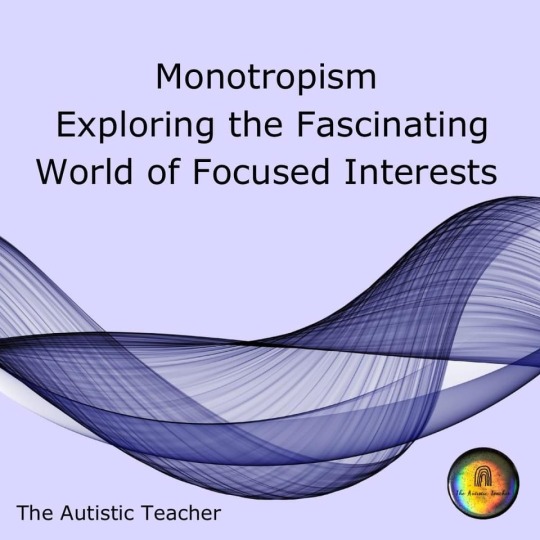
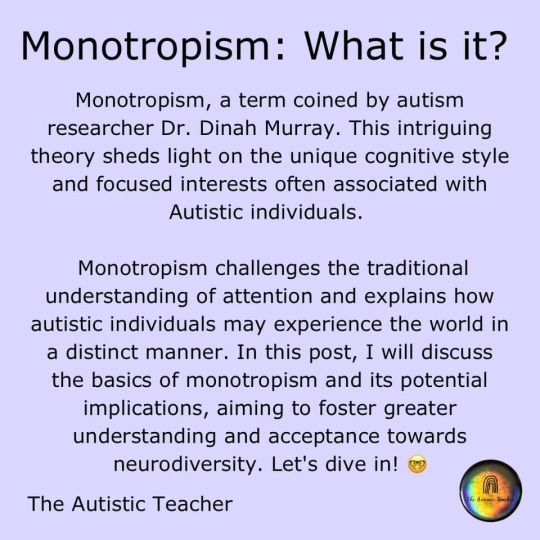
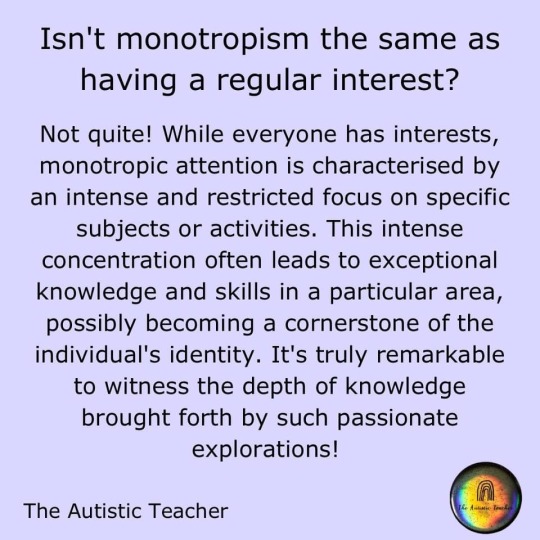
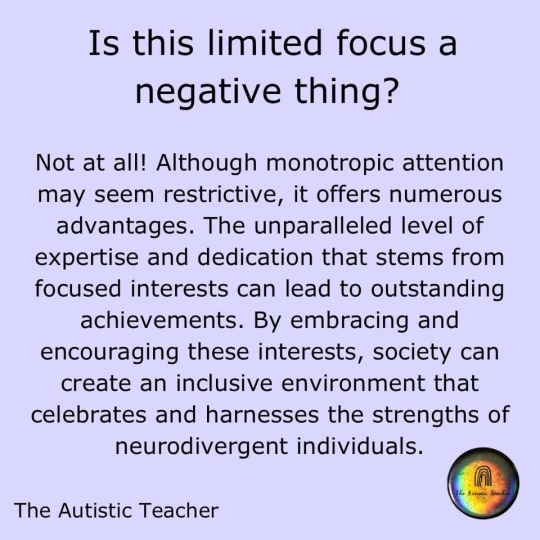
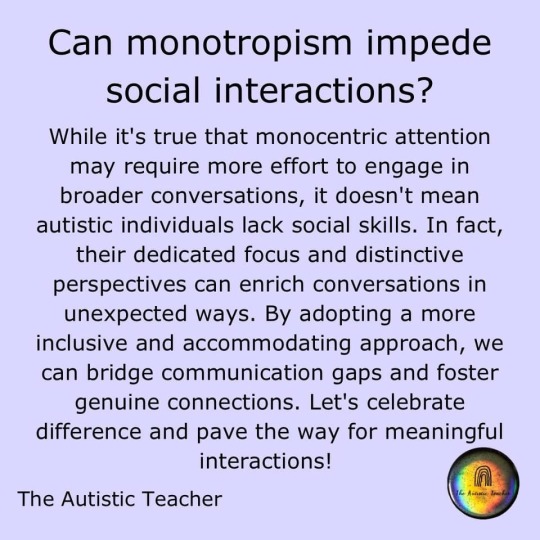
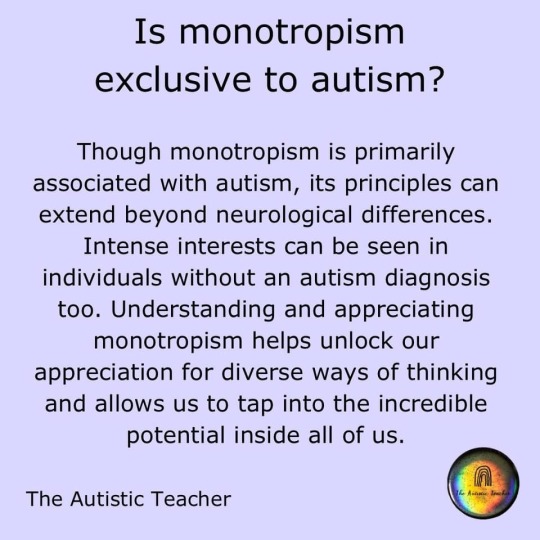
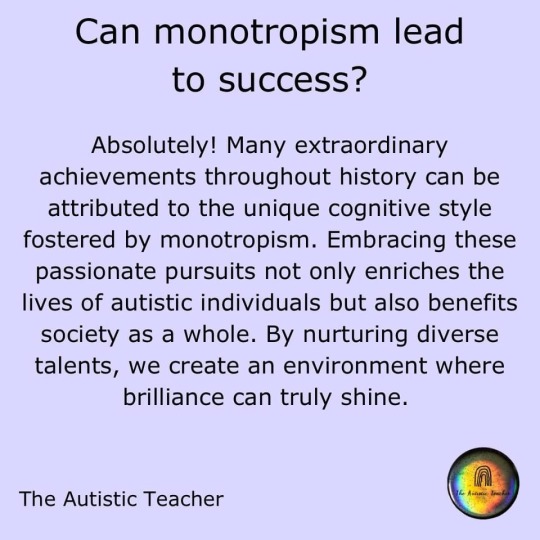
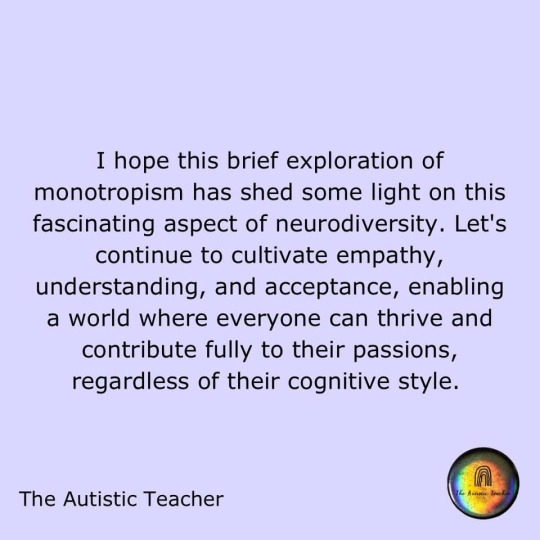
The Autistic Teacher
#autism#actually autistic#Monotropism#is characterised by an intense and restricted focus on specific subjects or activities.#this is a restricted knowledge/interest in a specific subject#I guess mine would be neurodivergence? IDK.#neurodivergence#neurodiversity#actually neurodivergent#feel free to share/reblog#The Autistic Teacher (Facebook)
181 notes
·
View notes
Text

86 notes
·
View notes
Text
Six Things Educators Must Know About Neurodivergent People
Six Things Educators Must Know About Neurodivergent People
Here are six things we think every educator must know about neurodivergent people. By understanding these, we make “all means all” more meaningful.
Spiky Profiles
Monotropism
Double Empathy Problem
Rejection Sensitive Dysphoria
Exposure Anxiety
Situational Mutism
Table of ContentsSpiky ProfilesMonotropism & the Double Empathy ProblemExposure Anxiety, Rejection Sensitive Dysphoria, and…

View On WordPress
#double empathy problem#education#exposure anxiety#human centric education#love languages#monotropism#neurodiversity#rejection sensitive dysphoria#situational mutism
396 notes
·
View notes
Text
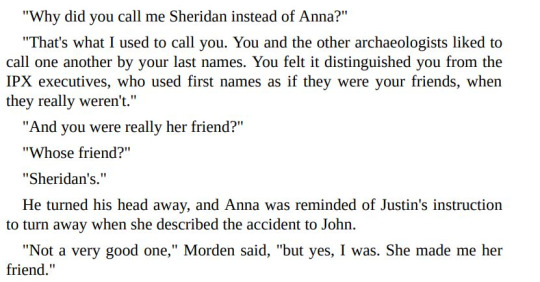

#sorry for monotropism tag#personally if i was given the chance to suicide pact with anna sheridan i would do it. RIP to this guy but I'm different
19 notes
·
View notes
Text
youtube
This breakdown of masking fits my experience like a glove. If you know me, or anyone else who is/might be autistic, please watch this.
#meg is the queen of demystification#especially if you are late-diagnosed#masking#mental health#monotropism#audhd#autism#i'm autistic now what#youtube
11 notes
·
View notes
Text
can't make this a real serious linked post because i'd be beyond a parody of myself but it's sort of neat that castiel's autistic traits can be tied back to the same sort of things that can cause autistic traits in human beings. not to say we have a full somatic medical understanding of autism in humans but there's clear links of the comorbidities of connective tissue disorders inter alia and neurodevelopment where. for example. if your connective tissue is not as reliable as usual you then may not ever grow familiar & automatic with it and therefore not develop strong interoception / proprioception, so you don't know how or when it's safe to fade out recurrent stimuli and your focus looks more like overcorrecting hyperfocus* (*this inches towards the monotropism theories which i care less for actually but that's discourse for another day) both physically and mentally with alexithymia and social difficulties not just Because You Just Don't Get It! but because your mind+body is slipping and sliding and reacting unexpectedly so you get terrible feedback from any situation let alone the INTENDED bad feedback from society so instead you can maybe manage by relying on logic and facts in held structures instead. and cas is. well. huge sensory input capacity angel shoved into new tiny human body. Direct allegory all the connective tissue is squished in there all wrong and novel. Of course he's autistic. if this was part of the lore of a brandon sanderson series or something like that there would be multiple subreddit theory threads talking about how genius it is as a world- and character-building brushstroke and how much sense it makes but you know it wasn't on purpose even at all
#this post honestly brought to you more by me getting mad about monotropism theory than enamoured w gay angel. and also. By me travelling rn#long post#i .
9 notes
·
View notes
Text
Monotropism
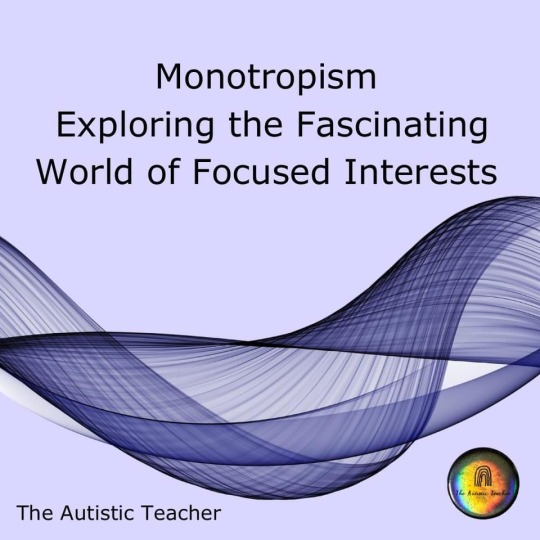
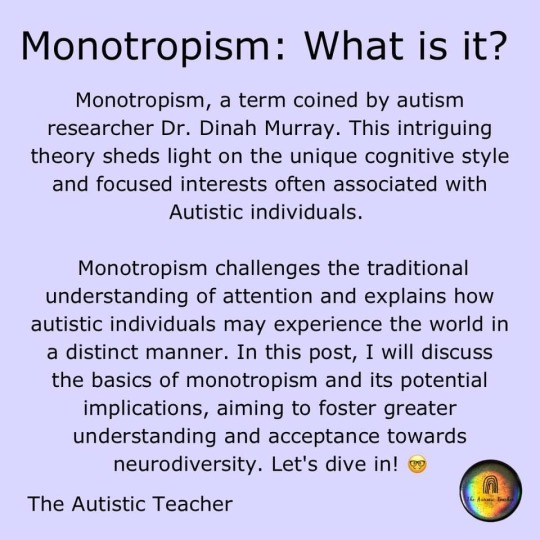
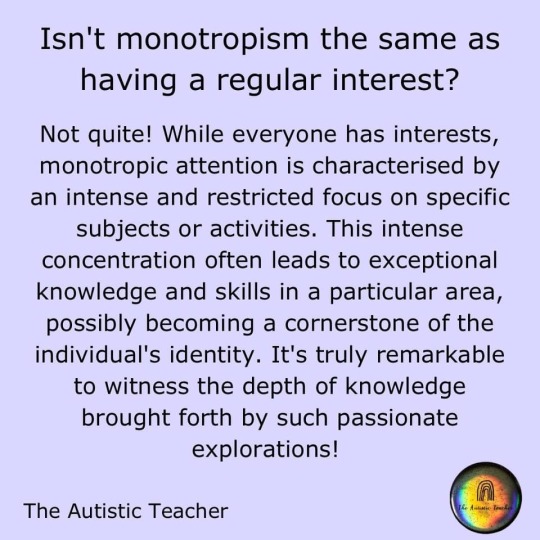


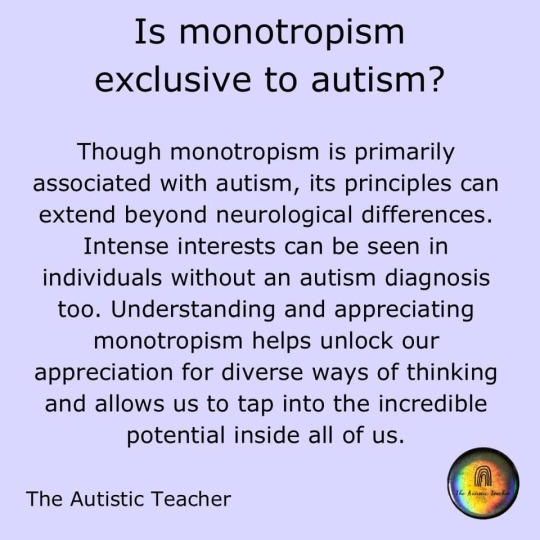
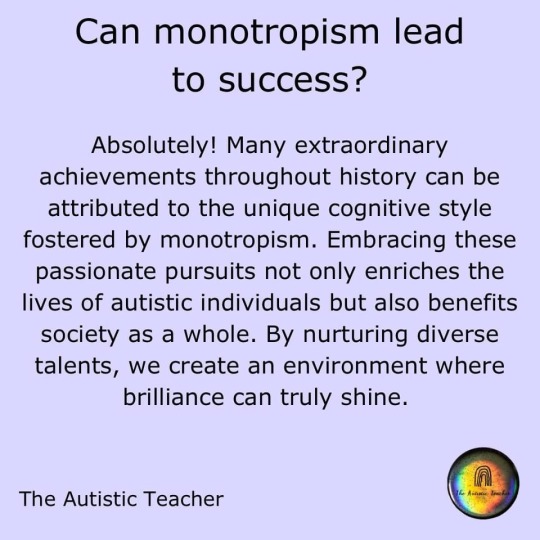
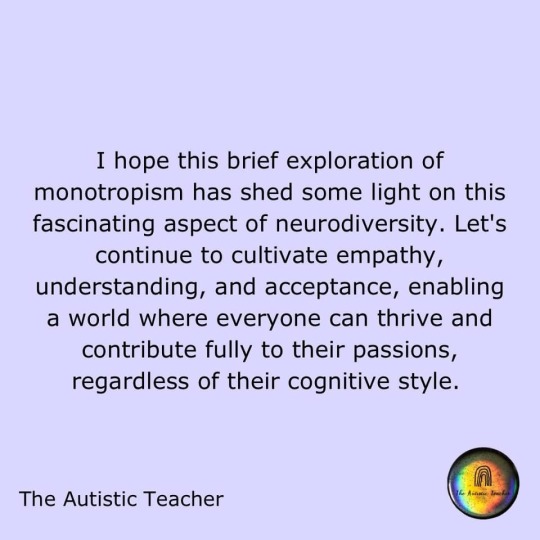
The Autistic Teacher
#autism#autism awareness month#autism acceptence month#monotropism#deep interests#neurodivergence#neurodiversity#actually neurodivergent#feel free to share/reblog#The Autistic Teacher (Facebook)
114 notes
·
View notes
Text
Huh. So... Uh.. I feel like this whole idea of Monotropism is the scientifically written out version of a unified theory about the autism and ADHD spectrum that I've been looking for and - at least to me it makes a lot more sense than the allistic views of ADHD and autism that landed in diagnostic manuals.
Here's a whole page about the overlap between both, with sources and all, and holy heck I am so gonna devour all of that info.
Also love the idea of reframing our label, "Kinetic Cognitive Style" instead of just slapping a "deficit disorder" on us when in reality the problem is the hypercapitalist environment that tries to push us into being capitalism soldiers instead of people who spend time and effort efficiently on things they are passionate about and that actually help society..
11 notes
·
View notes
Text
A monotropic individual focuses more detailed attention over fewer attention streams than a polytropic (non-Autistic) individual. When they are forced into environments where they must perform like a polytropic person, the amount of attention to detail they apply to multiple attention streams doesn’t decrease, all that happens is the monotropic mind experiences trauma by being pushed into trying to give more attention than any individual can cognitively give.
I call this monotropic split. The monotropic mind is having to split its attention and give more mental energy and attention than it has available to be able to withstand the environment it is in and remain safe.
When we think of an Autistic person experiencing overwhelm, we are thinking of a monotropic mind taking on more than it can process and creating meltdown or shutdown. Therefore, experiencing monotropic split is the cause of meltdown or shutdown.
When we think of an Autistic person who masks, “copes” and “gets by” which eventually leads to burnout or mental health crisis, we are again thinking of a monotropic mind being forced to perform in a way that traumatises its processing capabilities. This is monotropic split causing trauma, burnout, or mental health crisis.
When we think of a child stuck in a constant state of hyperarousal, looking out for danger because they are being put through a school system that forces them to perform polytropic tricks. Monotropic split and the subsequent cognitive trauma is the cause of the constant hyperarousal.
Autistic demand avoidance is a result of monotropic split because the Autistic person simply has been working in a state of attention hyperactivity for so long that they cannot tolerate any demand as that would re-traumatise their already overstretched attention capacity, so therefore they avoid the demand.
Monotropic split is something that every Autistic person experiences to varying degrees as a result of existing in an unaccommodating world.
(source)
6 notes
·
View notes
Text
Me: heehee homestuck reference
My friend: i could literally start shooting you and you would say “oh my god homestuck reference”
Me: … well in the first intermission
My friend: STOP
4 notes
·
View notes
Text
Most people (at least I think): Okay I'm going to spread my homework out evenly throughout the week
Me: *waits for the one day I randomly have enough energy to do the whole week's assignments in one sitting*
4 notes
·
View notes
Text
Painting stories
I've been writing for the first time since before my autism diagnosis, and what I've learned over the last 10 years about how my mind works has helped me to better understand what my writing process is and why.
Turns out, I write like a painter, in layers.
My mind is monotropic. I can't focus on multiple things at the same time, but I can switch tracks to focus on something else. I've always done this as a software engineer. I can't code and design at the same time, so I code first and make it pretty later (time allowing).
It just hit me over the weekend that I have do the same thing when I write. I start out writing a section of the story in a bare-bones way, like a pencil sketch with a little shading. It's more than just an outline; it includes most of the dialog but only enough description to make it make sense. There's no color and very little emotion.
Next, I go back over it and start adding color — more description about people, objects, settings, etc.
After that, I go through and add more information and/or tweak it to convey more about the characters' thoughts and emotions, and look for opportunities to add humor.
Finally, I work to blend the rough edges and touch up spots where it isn't working. It helps if I let time pass before this step to give me some distance, but I don't always have the patience for this.
(I also touch up the mechanics during each of these steps, replacing re-used words, typos, etc., or correcting inconsistencies that I missed on the earlier passes.)
This process is time-consuming. I'll never be a prolific writer, but it's what works for me. In the past, I've been frustrated with myself because I've never heard other writers describe a process like this, so I thought I was doing it "wrong". I realize now that it can't be wrong because it's the only thing that works for me.
5 notes
·
View notes
Text
I finally took a quiz that said I’m autistic! My sister and nibling have been telling me for a while that they’re autistic and I am too, but every quiz they gave me said no until this one. If this accurately describes autism for some people, I feel like I’m part of a pretty cool group of favorite weirdos now. (The data comes from autistic people too, not just old questions like “do you have no empathy and no friends.”)
PS Sorry to my friends if - I mean WHEN I’ve been inexplicably annoying, but now at least I have an explanation maybe.
11 notes
·
View notes
